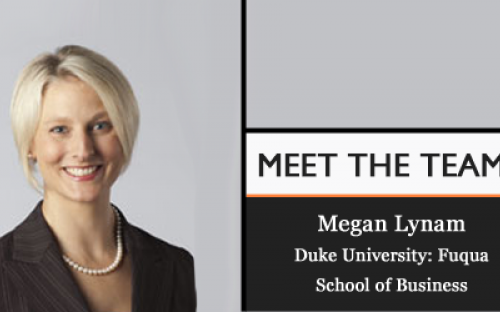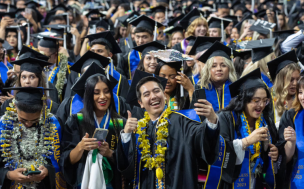The Fuqua School of Business offers a range of MBA options, including a Cross Continent MBA, Global EMBA, Full-time MBA, and Executive MBA. Duke University was founded in Durham, North Carolina, in 1924, and many Americans refer to the university as the ‘Harvard of the South’.
We talked to Meg about what it’s like to live and study in Durham, how to get ahead in the interview, and which MBA course option might be suited to you.
How long have you worked at Duke University's Fuqua School of Business?
I have worked at Duke since 2005 – always in Admissions, but my first role was focused on marketing, then operations, and now I am able to fuse my experience in both areas into my current position. My relationship with Fuqua actually began in 2000, however, as a Daytime MBA applicant.
I was deeply involved in Admissions and Student Government as a student in the program, and two years after I graduated in 2003, I realized that my passion was in education. I had kept in touch with Liz Riley Hargrove, now our Associate Dean for Admissions, and was fortunate to have the opportunity to return to Fuqua as member of the staff.
What’s more important: GMAT score, or work experience?
Neither one is more important than the other in our process. I’m quite proud of the fact that we do not screen applicants based on GMAT scores or GPAs or years of work or any other single dimension. Every application is read at least twice and is discussed in our committee meetings in detail. Applicants spend a lot of time on their applications, and we do the same when we evaluate them.
The students in our community are here because of who they are as a holistic person and what they have to contribute – both at Fuqua and when they graduate.
This is a sum of a number of things – academic readiness, the quality of their work experience, the extent to which they have impacted their companies and organizations and communities, their unique perspective based on where and how they were raised and what they have chosen to pursue in their lives, their interpersonal skills and fit with Duke, and so on.
Have you ever had a candidate who applied for an MBA too soon or too late in his/her career? When is the best time to apply for an MBA?
Duke is committed to developing the global business leaders that the world needs. The fact is, they don’t all decide to go to business school at the same time. Thus, we have developed a portfolio of programs that ensures that no matter where someone is in their career, we have a program that will help them to become the business leader they aspire to be.
We have a one-year, pre-experience Master in Management Studies program that helps those just out of undergraduate programs, with less than two years of professional experience, to jump start a career in business.
Our Daytime MBA caters to the more “traditional” US-based MBA format – a two-year, full-time program. It has a highly flexible curriculum with eleven possible concentrations (each student can pursue up to two), as well as a rich extracurriculum to allow our students to cultivate their leadership skills and to pursue their passions outside of the classroom.
We developed our Cross Continent MBA program for a similar demographic to the Daytime MBA in terms of career experience (on average 5-6 years), but the program is unique in that it allows students to continue to work while participating in a deeply global program. It combines residencies, which are in-person learning experiences with classmates and faculty members embedded in one of our global locations, with periods of distance learning. This allows students to live and work wherever it makes sense for their career, while concurrently earning an MBA that provides them with true “global competence.”
Our Global Executive MBA program is a similar format to the Cross Continent MBA, but the cohort is made up of senior business leaders – entrepreneurs who have started their own companies, division heads, C-level executives, and the like. It is perfect for those who did not stop to get an MBA earlier in their career, but now highly value the leadership development and mentorship of other global leaders in addition to the foundational skills of a business program.
We also have a Durham-based program for working professionals, the Weekend Executive MBA program, for managers with over five years of work experience. This is ideal for those within reasonable travel distance from Durham, as it meets every other weekend.
What’s your favourite interview question?
Aside from your alarm clock, what makes you get up in the morning? Meaning – what are you passionate and excited about getting done that day that makes you want to get up and get started? I love learning what drives people.
How do you differentiate between the very best candidates?
The application process for our working professional programs and our MMS program is highly personalized. We have counsellors that specialize in each of these programs, and we work closely with prospective students to help them better understand our programs and to ensure that there is a mutual fit between the student and the program. As a result, we get to know them quite well.
For our Daytime program, the pool is larger, and though we try, our Admissions team cannot possibly meet every candidate. This is why questions like our 25 Random Things essay is so helpful for the Daytime program. We hope to get to know our applicants beyond their transcripts, resumes, and the other two-dimensional aspects of their applications. We genuinely want to know who they are.
Most of our applicants are qualified for our programs in terms of academic horsepower and solid work experience – it is how people do what they do, what people do beyond what they are expected to do, how people are shaped by what life has dealt them, and the like, that help us understand the holistic person. It is that person – not a GMAT score or a job at a well-known company, that is sitting in our classrooms.
Ultimately, we are seeking a diverse community of those who will be the global leaders of the future – the ones who will tackle some of the major issues facing the world today, and who have a sense of responsibility to make the places that they work and live better. When we find them in the applicant pool, we know it… and they know that Fuqua is an exceptional environment in which to grow and learn.
What does a Duke-Fuqua MBA get up to at the weekend?
Every weekend kicks off with Fuqua Friday – a happy hour for the entire Fuqua community – students from all programs currently on campus, staff, faculty, partners, and families. What fills people’s weekends beyond that will depend heavily on their personal interests.
We are fortunate in Durham to have wonderful weather and great outdoor activities. Duke owns quite a bit of land that they have maintained as forest and there are great running, hiking, and mountain biking trails. Durham is also part of what is called the “Triangle” with Chapel Hill and Raleigh. All are smaller cities, each with a major university, and there is a hotbed for entrepreneurial ventures in the middle of them called Research Triangle Park (RTP).
RTP and the universities attract an incredibly diverse and highly educated population to what is a smaller metropolitan area. As a result, the area is full of restaurants featuring food from around the world, art museums, performing arts centres, and major and minor league sports teams.
There is also a strong college athletics rivalry amongst the schools in the area, particularly when it comes to basketball, where Coach K (also the coach of the gold medal winning Olympic team) has built a legacy of exceptional teams at Duke.
We get all of this culture, but with an incredibly low cost of living and virtually no traffic! It is no surprise that Durham has been voted one of the best places to live in the US and was named the “Foodiest Town in America” by Bon Appetit magazine. I have lived in 14 cities around the world, and I would choose Durham over anywhere I have lived or worked!
What’s the top perk of working at a business school?
Just one? I’m not sure I can limit it to that! It is more of a lifecycle. I am fortunate to travel the world for my job, and in each place, I am welcomed warmly by our alumni. They are always excited to show me their city or country, to share their culture, and to learn about how things are back at Duke.
I meet amazing prospective students at our events in each city, and my role is to help them to understand what makes Duke special, and whether or not the school is a good fit for them. When there is a strong cultural fit between a school and a student, the student truly flourishes, and it is a transformational experience.
As the application cycle progresses, I reconnect with prospective students – either via email or in person when they visit campus. When each new class starts, it is full of the enthusiastic, smiling faces that my colleagues and I met, when we were out on the road. It is incredibly rewarding to see them at Duke, pursuing their passions and challenging themselves to grow in a highly supportive community. Then, eventually, I will see them again – back on the road – welcoming me as one of our alumni to their home.
RECAPTHA :
ac
da
59
c0







